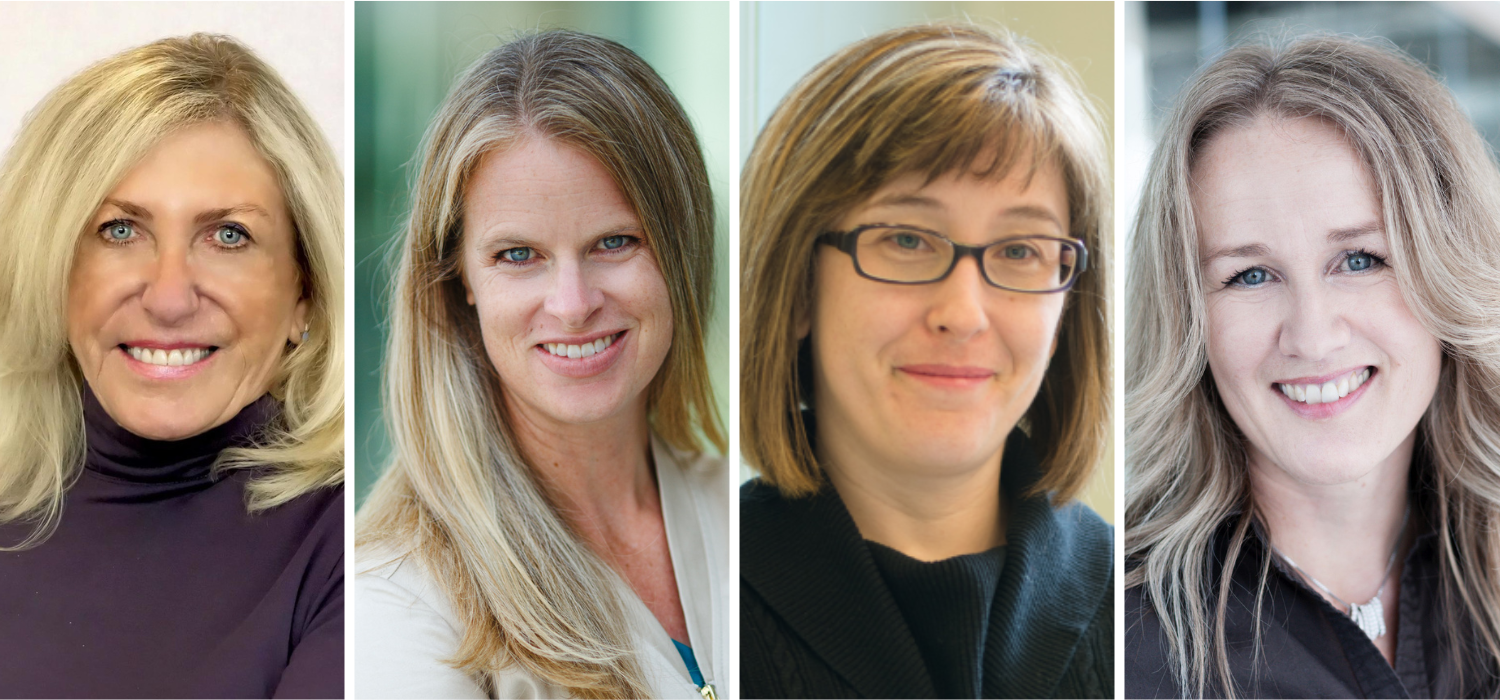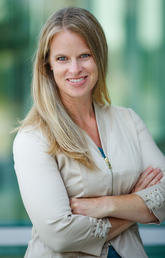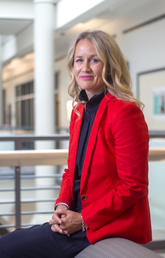Jan. 3, 2023
Meet four UCalgary Nursing faculty members who hold multiple degrees from UCalgary

The idea of ‘grow your own’ faculty has mixed opinions from many in post-secondary education. But undeniably, the concept can create instructors who are already connected to the community and likely share some of the lived experience with the students they teach.
Meet four of UCalgary Nursing alumni who contribute to our community:
- Dr. Nancy Moules BN’95, MN’97, PhD’00, associate dean (research) and professor
- Dr. Merilee Brockway BN’04, PhD’19, assistant professor
- Dr. Cydnee Seneviratne MN’97, PhD’08, associate professor (teaching)
- Dr. Catherine M. Laing BN’98, MN’08, PhD’13, associate dean, undergraduate program and associate professor
What made you choose UCalgary Nursing in the first place for your education?
NM: For me, it was a pragmatic decision. I had moved back to Canada as a single parent and was staying with my parents to help with childcare. It was the only option, but it turned out to be one of the best decisions I’ve made in my life.
MB: For my BN, it was the accelerated track — the ability to complete my degree in 20 months was very appealing. I was working as an instructor in the UCalgary BN program when I started my graduate degrees, so I stayed with UCalgary because we were well supported to complete graduate studies and remain on staff.
CS: When I started my master’s in 1995, I chose UCalgary because of the faculty who were part of the Family Nursing Unit. Once employed by the Faculty of Nursing, I was able to complete my PhD with Dr. Karen Then and conduct a postdoctorate with Dr. Kathryn King-Shier. Part of my decision also included location. I live in Calgary and it helped my young family to be able to attend a local university.
CL: I was born and raised in Calgary so I never even questioned going to another institution!
What was the benefit for you of doing multiple degrees from the same institution?
NM: I had no interest beyond getting my post-RN BN. However, the magic of one area of Family Systems Nursing (FSN) captured me and it was offered in one place in the world — UCalgary. I applied for my master’s degree in FSN, and while doing it, realized I wanted a doctoral degree in this area so where else would I apply? I had to do it at UCalgary. I had no incentive to go elsewhere. Also, I began to realize that UCalgary was my home, and I didn’t want to leave home ever again.
MB: I did not go elsewhere for a couple of reasons. I had an established family and partner with a solid income here in Calgary. And I had excellent established relationships with the staff and students at UCalgary. I knew that there were some very strong researchers in the area of maternal-child health who I wanted to work with. Plus, I had some wonderful mentors who emerged in my undergrad and kept cheering for me throughout all of my grad studies…it was so powerful to have people who believed in me.
CS: The focus of my PhD and postdoctorate research was interprofessional practice in neurology and cardiology contexts. Calgary offered two wonderful research contexts that would assist me to conduct my ethnographic research. In addition, I believe graduate education includes choosing the best people to support you and both Dr. Then and Dr. King-Shier offered the guidance and support I required to be successful. Choosing excellent supervisors is the key to enjoying your graduate work and experience.
CL: There are definitely pros and cons to doing all your post-secondary education at the same institution. On the one hand, you come to know the institution really well — and especially when several of your degrees are within the same faculty — that faculty gets to know you too. That can come in handy because, for example, as I was getting close to finishing my PhD, the dean at the time let me know that she would be posting for an assistant professor role in cancer care (which is my area). If she didn’t know me and know my research focus, she wouldn’t have thought to cue me about that job! On the other hand, it is generally thought that getting degrees from different institutions diversifies your thought, so to speak — makes it so you’re not within an echo chamber.
What did you learn about yourself while studying nursing?
NM: That I could think differently: that I was smarter than I knew and had something to offer.
MB: That I am very good at relationship building and this is probably my biggest strength as a nurse.
CS: I have always believed that nursing was a profession that offered many opportunities, including but not limited to caring for people at the bedside or in the community.
Nursing is a profession that assists you to grow and reflect about yourself given the many challenging and rewarding situations we are experiencing.
CL: I learned how good I was with kids. I always knew I liked kids, but when it came to nursing adults versus nursing kids I was much more at home in a paediatric environment. I also learned how to organize (triage) my school work and my life really well!
What’s the best thing about your current job right now and why?
NM: “n a faculty position, I say thank you to the gods that led me here every day. It is the most exciting, thoughtful, creative, flexible, fun ‘job’ I’ve ever done.
MB: I get to do what I love! I get to ask questions about the world where we practise as nurses and then investigate these questions to improve the lives of others. Also, mentorship — this fills my bucket. I love working with students and trainees!
CS: I most enjoy being challenged by engaged students. My passion is teaching, and I cannot imagine myself not being able to work and learn with my students.
CL: “he best thing about this role is I get to do it all — operations (my strength) takes centre stage, but I still teach and do research, albeit less now that I’m in an administrative role. I like being able to think strategically about the undergraduate program and am in a position to influence the direction we head.
Career highlight or proudest professional accomplishments so far?
NM: I think holding a Killam Annual Professorship, the ACH/ACHRI Professorship for five years, the Kids Cancer Care Nursing Chair for five years, and being awarded the Order of the University of Calgary would be competitive to a certain extent. All so honorific. However, I think it was winning the UCalgary Teaching Excellence in Graduate Supervision and the GSA Great Supervisor Award that made me most proud. They were student nominated and I love my students.
MB: Being nominated for a Canada Research Chair for a program of research that I started to envision five years ago. It is really amazing to see it come to fruition.
CS: I have experienced a couple of highlights during my career. During my graduate education, I received the FUTURE Program for Cardiovascular Nurse Scientists Fellowship (a CIHR Strategic Training Program in Health Research) PhD funding, as well as received Heart and Stroke Foundation funding for my postdoctoral research. In 2017, I received the College of Registered Nurses of Alberta (CRNA) Excellence in Nursing Education Award. Most recently, I am proud to have been awarded research funding as a co-principal investigator [with Dr. Kara Sealock] from the Taylor Institute for Teaching and Learning, and from the Canadian Association of Schools of Nursing (CASN) as a co-investigator with Dr. Sealock (PI) and Dr. Tracey Clancy (CO-I). The best part about my work has been building meaningful collaborative relationships in teaching and research.
CL: Finishing my PhD was such an amazing feeling that I know I’ll never replicate. Also, in 2018 I won the Journal of Pediatric Oncology Nursing APHON Writing Award which meant a lot to me, as that’s a key journal for my research and that project meant a lot to me personally. To be recognized for that piece out of everything published in the journal that year was such an honour.
How did your degree(s) and experience at UCalgary Nursing help you get to where you are right now?
NM: They prepared me well and basically took me to where I am now. I learned how to teach from them, how to supervise, how to conduct good research, what kind of professor I wanted to be.
MB: It allowed me to establish relationships with existing researchers and community partners. I was able to build a program of research on a foundation that I began to establish when I was in graduate school.
CS: Without my graduate education I would not have been able to be the associate dean undergraduate practice education (2015-2018). Graduate studies exposed me to leadership and education principles that helped me to be compassionate and understanding as associate dean. I also had the opportunity to be a member and chair (2014-2018) of the Nursing Education Program Approval Committee at CCRNA. In addition, I am now an accreditation reviewer for the Canadian Association of Schools of Nursing. None of these opportunities would have been an option without graduate education.
CL: Right after graduating I started working in paediatric oncology and didn’t leave until I came to do my PhD. I went from staff nurse, clinic nurse to unit manager and then program manager in paediatric oncology, and that experience in management with AHS is very applicable and similar to my current associate dean role. Getting my MN degree was the reason I was hired into manager roles at AHS, so everything is very interrelated!
Favourite memories to share from your education years?
NM: Working in the Family Nursing Unit, doing clinical work with families experiencing suffering because of illness and relational problems.
MB: Our academic writing group during my PhD. I built so many wonderful relationships with people in this group and I still am friends with many of them today.
CS: My best memory was during my master's and working with students in the Family Nursing Unit. Although, I was not directly part of the unit as my research was separate, I developed wonderful friendships that have led to fantastic work relationships as we now work at the Faculty of Nursing.
CL: I absolutely loved everything about my BPE (KNES) degree, from the sports to the classes, to the people, it was the best time of my life. In nursing, clinical was always the highlight every year. The first birth, the first death, the first time in the operating room…all these intimate moments in people’s lives that you are invited into by virtue of being a student nurse were all amazing memories.
Favourite campus hangout spot?
NM: Are you kidding? LDL [Last Defence Lounge], hands down.
MB: LDL. Or The Empty Space for yoga.
CS: Mac Hall and the graduate lounge.
CL: It depends on which degree! My first degree, definitely the Den. From then on, the library, LDL, Hotel Alma restaurant (when it was still in existence). I also love just walking around campus and taking in the vibe.
Advice to students wanting to pursue a similar career trajectory as you in academia?
NM: I think now the transition from PhD to a faculty position needs to include postdoctoral study or you will not be competitive. Start thinking about that right away. And get involved — committees, volunteer, be known, get to know others, be yourself and be clear about what you offer in what lane. Why you in this place at this time?
MB: You can enjoy a career in academia. It is a lot of work, but with appropriate boundaries, it can be very fulfilling.
We get paid to think about how we can do things differently, change practice and improve the lives of the patients and populations we care for.
CS: Don't limit yourself by following a path in academia that others have chosen for you. Choose what complements your passion and that will lead you to not only a productive but enjoyable career path.
CL: Even though you might do a first degree that you ultimately don’t end up using, it is NOT a waste of time! The amount I learned that first degree about how to be a university student, life, what I was interested in, etc. led me to where I ultimately needed to be. I guess my advice would be to be patient with the process and trust that if it feels right, it probably is.


